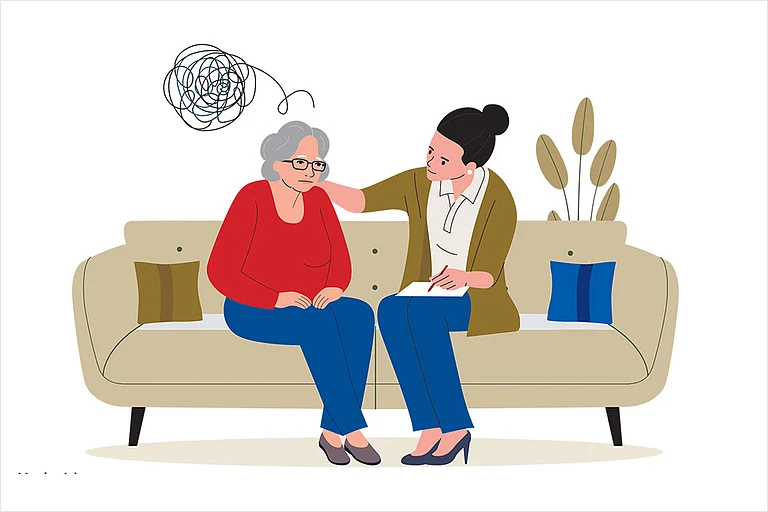
Summary of this article
· Digital binging leads to physical ailments like tech neck
· Mental health issues have surged due to excessive screen time
· Implementing digital detox can enhance sleep and focus
Digital binging is gradually pervading every sphere of life, and without it, life seems incomplete. The young generation, Gen-Z, feels digital tools and social media are a necessary part of life, whereas Gen Alpha is exposed to digital technology from birth. The rapidly growing digitalisation, new apps, new features, easy connectivity, and active social media, reels, shorts, and always present digitally, make it harder for people to disconnect and relax. Rather, they easily get trapped in digital binging, affecting their physical and mental health in the long term.
According to a research report, ‘Impacts of digital social media detox for mental health: A systematic review and meta-analysis’ published in 2024 on the National Library of Medicine website, cites World Health Organization (WHO) report which suggests a 13 per cent increase annual increase in the mental health issues, affecting 264 million people with anxiety and 280 million people with depression.
It says, “Digital technology has become an integral part of contemporary life, revolutionising communication, work, and leisure. However, the pervasive use of digital devices has raised concerns about their potential impact on mental health. The incessant notifications, information overload, and the pressure to maintain a digital presence can lead to increased anxiety and a sense of being constantly “plugged in.” Moreover, the addictiveness of digital devices and social media platforms can disrupt sleep patterns, affecting the quality and duration of rest. The continuous stimulation from screens may also contribute to difficulties in focusing, attention deficits, and a decline in overall cognitive well-being.”
A period of excessive and often uncontrolled use of digital devices or online platforms is called digital binging. For example, watching an 8–10-hour series on an OTT platform in one go, scrolling through Instagram or other platforms until late at night, playing online games for long hours at a stretch, etc.
Side Effects Of Digital Binge
Physical Health: Excessive use of digital devices, such as smartphones or laptops, for long periods, can negatively affect one’s physical health as one constantly needs to look down at the devices. Overall, the body undergoes stress. The tilted head position for long hours puts undue stress on the cervical spine and neck muscles, leading to shoulder pain, stiffness, and other ailments.
Dr Uma Malliah, Senior Consultant, Ophthalmology, Indraprastha Apollo Hospital, Delhi, highlights the side effects, saying, “Long hours of screen time have a direct impact on physical health, such as posture, vision, and sleep. Prolonged sitting often leads to slouching or hunching and causes strain in the neck, back, and shoulders. Looking down constantly at devices can lead to “tech neck” and long-term spinal issues.”
But it is not the only health issue caused by Digital Binge. “Vision is affected due to digital eye strain. People may experience dryness, blurred vision, or frequent headaches because of focusing on screens for extended periods. Exposure to blue light disturbs the production of melatonin, making it difficult to sleep and reducing overall sleep quality.”
Mental Health: Affirming the negative impact of digital binge, Dr Malliah says, “Continuous exposure to messages, notifications, and other content overstimulates the brain, creating a state of hyper-vigilance and restlessness.”
She further adds, “Besides, too much multitasking between apps and screens fragments focus, making it harder to focus on tasks. Over time, this can impair cognitive performance. The lack of offline social interactions limits one’s emotional resilience and increases isolation and stress.”
What Are The Early Warning Signs?
Although it would be impractical to forsake digital media in today’s time, one should not ignore the early warning signs. Whether intentional or forced, conscious or unconscious, digital binging can leave one with stiff muscles, eye discomfort or blurred vision, difficulty in maintaining focus, disrupted sleep, persistent fatigue, reduced productivity, and chronic pains, says Dr Malliah.
Digital Detox: Why A Digital Detox Is Essential
Digital Detox is the opposite of digital binge. It is a designated period without an electronic device to reduce stress from virtual presence and enhance real-world interaction. It is essential to annul the adverse impact of too much use of digital technology. It enhances sleep quality, improves focus, eases tech-neck symptoms, and enhances real-life social interactions.
How To Practice Digital Detox?
20-20-20 Rules: Dr Malliah suggests, “One effective step is practising the 20-20-20 rule, where every 20 minutes, you look at something 20 feet away for 20 seconds to reduce eye strain. Limiting device use at least one hour before bedtime helps improve sleep quality by reducing blue light exposure.”
Set No-Screen Zones and No-Screen Time: Setting an area as a no-screen zone, such as dining areas, or a no-screen time, for example, after 10:00 pm or so, can help in digital detoxification.
Track The Usage: Many applications have built-in time trackers and show the time one spends digitally. Be mindful of the time spent on digital media and balance the usage. Dr Malliah suggests switching off the non-essential notifications to avoid the urge to access the device and check the notification.
Replace Screen Time With Other Activities: Engage yourself in other activities, like playing outdoor games, meeting people in person, exercising, etc., to not feel the vacuum created by the absence of devices.
Ergonomic Setup and Mindful Usage: Make the study or work station ergonomically aligned. “Posture-friendly setups with ergonomic chairs, proper screen height, and regular stretching breaks support physical health. Practising digital mindfulness, such as using screens with clear intent rather than mindless scrolling, also helps, says Dr Malliah.
Remove Digital Clutter: Uninstall unnecessary apps from the device, and also keep the notifications off for not-so-necessary apps.
Start Small And Then Go Deep: Most importantly, start with micro-detoxes, like screen-free one hour before sleep, and gradually increase screen-free periods. Occasionally, one may try a digital fasting day to maintain a good balance in a digital diet.
It is accepted that digital binging is harmful for health, which may not be visible in the short term but has a negative impact in the long term. As digital footprints extend, digital detox also needs to become a part of life to ensure that technology remains empowering and not the other way out.



















